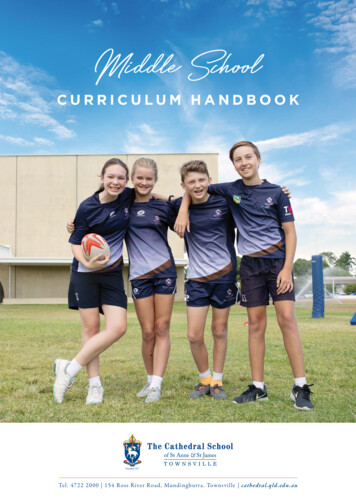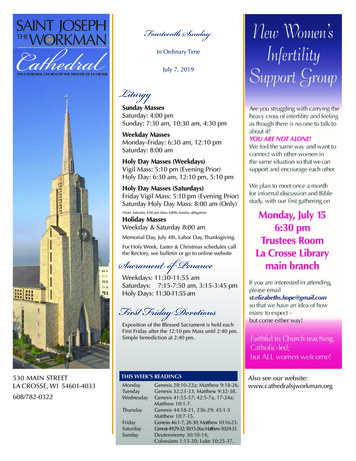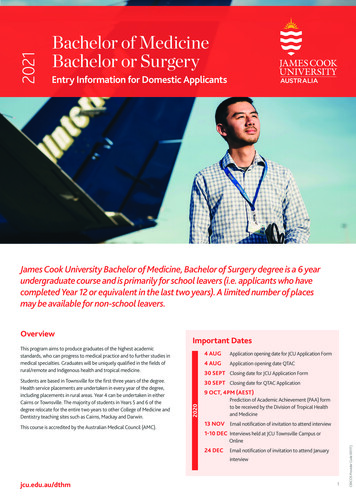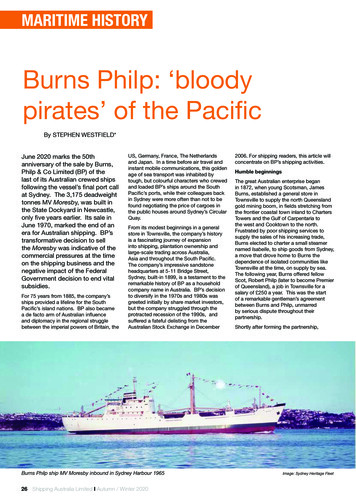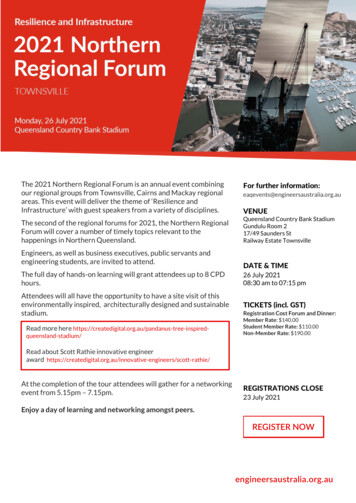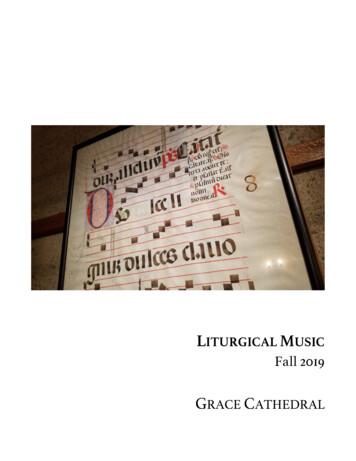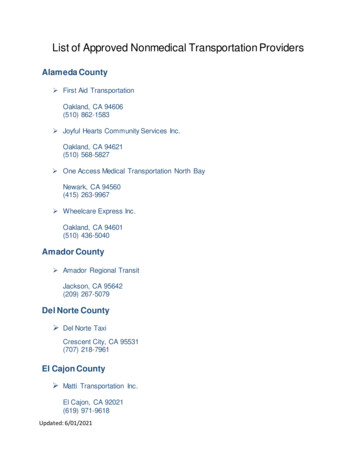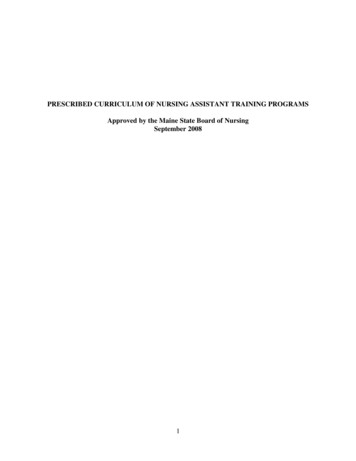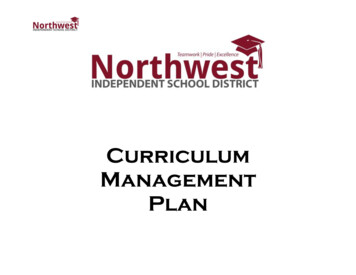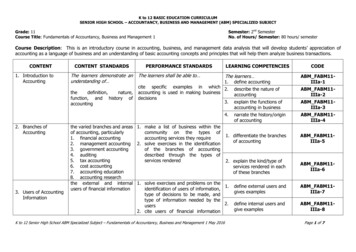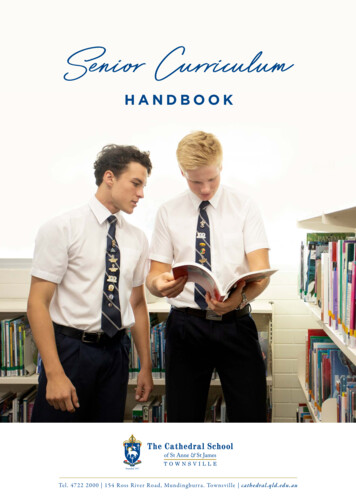
Transcription
Senior CurriculumHANDBOOKTel. 4722 2000 154 Ross River Road, Munding burra . Townsville cathedral.qld .edu.au
WelcomeWelcome to Senior Schooling at The Cathedral School. ThisCurriculum Booklet is a guide for students as they enterYears 10 and 11. At Cathedral, Year 10 is seen as a foundationyear that prepares students for Years 11 and 12.In Year 10 students can ‘sample’ senior subjects to assist themin choosing which pathway they would like to follow in the finaltwo years of school. In Years 11 and 12, Cathedral offers studentsmany options in their academic choices, as well as the supportthat matches students to the pathway that best suits theirinterests, tertiary prerequisites, career aspirations and personalstrengths. Students are prepared for employment, traineeships,apprenticeships, TAFE, the Defence Forces and university.The Cathedral School senior curriculum is a challengingand inspiring mix of traditional study and modern skillsthat equips students to take their place in the changingenvironment that is the workforce in the 21st century.Mr Allan CarmanDirector of Studies2 T HE CATHEDRA L SC HOOL
TABLE OF CONTENTSIntroduction5Year 10 Course Structure6QCAA Senior Syllabuses Available For Study24General Mathematics26English6Mathematical Methods27Mathematics8Specialist Mathematics2810Essential 11English As An Additional Language31Technology12Essential English32The Arts14Accounting33Health & Physical Education and Lifeskills16Economics34Christian Education16Geography35Personal Development16Legal Studies36Vocational Courses17Modern History37Senior Education Profile20Statement of results20Queensland Certificate of Education (QCE)20Senior subjects20Design38Digital Solutions39General Senior Subject39Engineering40Furnishing Skills41Underpinning factors21Hospitality Practices42Vocational Education and Training21Industrial Graphics Skills43Australian Tertiary Admission Rank Eligibility21Physical Education44Sport & Recreation46Biology48Chemistry49Physics50General syllabuses22Structure22Assessment22Applied sment23Drama53Music54Music Extension (Composition)55Music Extension (Musicology)56Music Extension (Performance)57Visual Art58Visual Arts In Practice59Vocational Education Courses - Yr 11 & 1260What Does A Vet Program Offer You?60Vocational Courses In The School61Vocational Courses With Outside Providers62S E N I O R C U R R I C U LU M H A N DB O O K 3
4 T H E CATHEDRA L SC HOOL
INTRODUCTIONYEAR 10University EntranceIn Year 10 students take a group of coresubjects (taken by all students) and electivesubjects (taken by some students).Students who are planning to go to university aftergraduating will generally study six general subjects orfive general subjects and one applied subject or oneCertificate course of Cert III or higher. A prerequisitefor most University courses is a satisfactory grade inEnglish or EAL (English as an Additional Language).However, it is important to be aware of otherprerequisite subjects that may be needed for entryinto a specific Undergraduate degree. Please notethat all tertiary providers have Foundation or Pathwaycourses for initial entry into University, if the requiredATAR or prerequisites are not met from school study.The core subjects are English, Mathematics(Advanced, General or Essential), Science,Humanities, Christian Education, Lifeskills PhysicalEducation and Personal Development.Elective subjects consist of Drama, Music, Japanese,Visual Art, Food Technology, Digital Technology,Production Design Technology, Graphical DesignTechnology, Health & Physical Education, CertificateII in Business and Accounting and Business.Music, Japanese and the Certificate II in Business(aimed at vocational students), are yearlong electivesand all other electives are studied for one semester.Students taking Japanese or Music in Year 10 areexpected to have studied these subjects in Year 9.YEARS 11 AND 12There are many pathways that students in theirsenior years can take. It is important in the firstinstance for students to have a general idea ofwhat they wish to do on leaving school as this willdetermine a student’s choice of academic program.Students at Cathedral will study English andMathematics and will choose four other electives.Vocational Study OptionsStudents who wish to combine school studies withvocational studies can do so at Cathedral. Somestudents even keep the tertiary study option openwhile taking up vocational studies. Within thesix subjects students elect to study over years 11and 12, internal and external Certificate courses,school-based traineeships and apprenticeshipsand regular work experience can all be included. Inthis way, students can learn valuable skills (whilestill at school) which they can demonstrate to anemployer on graduation. A robust and full schoolleavers resume can be an important component ofa vocational student’s repertoire of learning uponcompleting Year 12. For a more thorough list ofvocational courses, please turn to pages 60-62.At the end of Year 12 all students are eligible fora Queensland Certificate of Education(QCE). Thiscertificate records a student’s performance in awide range of studies that can be undertaken inYears 10, 11 and 12, including both academic andvocational forms of learning. The management of astudent’s eligibility for a QCE occurs on an individualbasis at the school. This process is managed bythe Careers Advisor and Director of Studies.S E N I O R C U R R I C U LU M H A N DB O O K 5
YEAR 10 COURSE STRUCTUREYEAR 10 ENGLISHDescriptionThe Australian Curriculum (English) involveslearning about English language, literature andliteracy. These three interrelated areas of learningform the core of the English curriculum.Through studying English, students learn to listen,read and view, speak, write and create increasinglycomplex and sophisticated texts with accuracy,fluency and purpose. Students come to an explicitunderstanding and appreciation of the nature ofthe English language and how it works to createvarious kinds of meanings. The study of English helpsstudents to extend and deepen their relationships,to understand their identities and their place ina changing world, and to become citizens andworkers who are ethical, thoughtful and informed.It also helps students to engage imaginativelywith literature, to understand and value informedappreciation, criticism and literary history.At The Cathedral School, the language,literature and literacy strands providestudents with the opportunity to: understand and use Standard AustralianEnglish in its spoken and writtenforms in combination with othernon-linguistic forms of communication;develop a sense of the capacity ofStandard Australian English to evokefeelings, and to organise and conveyinformation and ideas;use language to inform, persuade,entertain and argue;understand, interpret, reflect on andcreate an increasingly broad repertoireof spoken, written and multimodal textsacross a growing range of settings;develop interest and skill in inquiring intothe aesthetic aspects of texts, an informedappreciation of literature, and an understandingof literary criticism, heritage and values;develop proficiency in the increasingly specialisedwritten and spoken language forms of schooling.6 T HE CATHEDRAL SC HOOLThe general capabilities are embedded in theEnglish units. These capabilities are: literacy,numeracy, information and communicationtechnology competence (ICT), critical and creativethinking, ethical behaviour, personal and socialcompetence and intercultural understanding.Three cross-curriculum priorities are designedto support relevance and address contemporaryissues: Aboriginal and Torres Strait Islanderhistories and cultures, Asia and Australia’sengagement with Asia, Sustainability.Course OutlineEach teacher devises his or her own course basedaround a series of units. The units will focus on a novel,play, poetry, a genre, a theme – or a combination.A range of texts is studied including literary, massmedia and everyday texts. Grammar, spelling andpunctuation are explicitly taught in all units.AssessmentStudents will complete three written and onespoken assessment task for the year. The writtentasks are imaginative, analytical and persuasive/reflective/informative. The spoken task is anindividual speech. The assessment is completedunder a range of conditions that becomemore stringent as the year progresses.English (Supported Class)Based on diagnostic tests, NAPLAN results andwork from previous years, some students willbe offered extra support in a class designed tosuit their needs. In consultation with the Head ofEnglish, resources and strategies will be chosento enable students to engage with the course.
S E N I O R C U R R I C U LU M H A N DB O O K 7
Y E A R 1 0 C O U R S E S T R U C T U R E C O N T.Y E A R 1 0 M AT H E M AT I C SMathematics curriculum offerings at TheCathedral School follow the P-10 AustralianCurriculum material for Mathematics untilYear 10, and the new QCAA Senior SecondaryMathematics syllabus material in Years 11 and 12.The Nature of Mathematics – Mathematics fromPrep through to Year 12 is taught in a developmentalmanner. Topics are constantly being revisited eachyear, with the depth of coverage within any giventopic increasing each time. During Year 10, someof these topics reach their endpoint in relation tonew material, while new topics are introduced,particularly in Advanced Mathematics and continuingin Mathematical Methods and Specialist Mathematicsin Years 11 and 12. An emphasis is placed on thelife applications of mathematical concepts sostudents can gain an appreciation for their worth.Choices Available: Year 10 is the first instance wherethe P-10 Mathematics curriculum provides an elementof choice. This element of choice provides theopportunity for students to make subject selectionsbest suited to their anticipated career pathways,while also considering current abilities. All studentsmust study a Mathematics subject, choosing one of: Advanced MathematicsGeneral MathematicsEssential MathematicsThe flow chart below shows likely progressionpathways within Middle and Senior SchoolMathematics, dependent on various subject selections.M AT H E M AT I C S O P T I O N S & PAT H WAY SMIDDLE SCHOOLYEAR 10YEARS 11 & 12Specialist Mathematics& Mathematics MethodsMathematicsAdvanced MathematicsMathematics MethodsSupported Maths8 T HE CATHEDRAL SC HOOLGeneral MathematicsGeneral MathematicsEssential MathematicsEssential Mathematics
CAREER PATHWAYSBEYOND YEAR 10YEAR 9 RECOMMENDED RESULTSThe table below summarizes key differences between the Year 10 Mathematics options.ADVANCED MATHEMATICSGENERAL MATHEMATICSESSENTIAL MATHEMATICSYear 9 Mathematics –minimum B recommendedAny student with less than aconsistent B throughout Year 9will need to devote considerabletime to addressing topics thathave not been fully understood.Year 9 Mathematics –minimum C recommendedSome prior knowledge generallyassociated with a C standard inYear 9 Mathematics is expected.Extra work may be necessary forstudents below this standard shouldGeneral Mathematics be selected.Year 9 Mathematics – nominimum requirementIn particular, students who arecurrently in a Year 9 supportedMathematics class should considerselecting Essential Mathematics.Check with teacher if GeneralMathematics is being considered.Refer to progressionpathways flow chart.Advanced Mathematics preparesstudents for entry into Year 11Mathematics Methods and SpecialistMathematics, but students may alsoprogress into General Mathematics.Refer to progressionpathways flow chart.General Mathematics preparesstudents for entry into Year11 General Mathematics orEssential Mathematics.It does not provide sufficientcoverage for entry into MathematicsMethods or Specialist Mathematics.Refer to progressionpathways flow chart.Essential Mathematics preparesstudents for entry into Year11 Essential Mathematics.It does not provide sufficientcoverage for entry into any otherYear 11 Mathematics subjectAdvanced Mathematics needs tobe undertaken by students whowish to keep tertiary pathwaysopen within these fields of study Natural and physicalsciences (especiallyphysics and chemistry) Education (if secondarymathematics or science selected) Medical and healthsciences(some) Engineering (all fields) Computer science (includingelectronics and software design) Psychology (some) Business (some)General Mathematics providesthe necessary skills to leadtoward careers involvingtertiary study, vocationaleducation or workforce entry.Suitable tertiary fields of studyinclude business, commerce,education, IT, finance,social science and arts.Essential Mathematics providesthe necessary numeracyskills for vocational pathwaysand workforce entry.It may also contribute towardsat ATAR score, depending onother subjects studied.S E N I O R C U R R I C U LU M H A N DB O O K 9
Y E A R 1 0 C O U R S E S T R U C T U R E C O N T.YEAR 10 HUMANITIESAll Year 10 students study the subject Humanities.The course is structured to introduce studentsto the Humanities subjects offered in Years11 and 12. Students rotate through units ofEconomics, Geography, History and LegalStudies which are each taught by a specialistteacher. Accounting and Business is offered asa separate elective subject over a semester.Accounting & Business (Elective)Accounting and Business introduces students tothe General Senior subject Accounting and alsothe vocational education Certificate III in Businesscourse which is offered in Years 11 and 12. Accountingis a subject suited to students who are interestedin pathways beyond school that lead to tertiarystudies, vocational education or work. A courseof study in Accounting can establish a basis forfurther education and employment in the fieldsof accounting, business, management, banking,finance, law, economics and commerce. The Businesscomponent of this subject is more practical andprovides opportunities for students to gain skillsto succeed in an office or business environmentthrough the completion of certificate courses.YEAR 9Core Humanities:GeographyHistoryElective:Economics and BusinessYEAR 10Core Humanities (Rotation Units):EconomicsYEAR 11 & 12GeographyHistoryHumanities General Subjects:Legal ting and BusinessLegal StudiesCertificate II in BusinessModern HistoryElective:Certificate III in Business1 0 THE CATHEDRA L SC HOOL
YEAR 10 LANGUAGEJapanesePrerequisiteBackgroundStudents starting Year 10 Japanese musthave completed Year 9 Japanese. Studentsshould be proficient in reading and writingboth hiragana and katakana scripts.The aim of the course is to enable students todevelop an in-depth understanding of the Japaneselanguage and culture. There is an emphasis onachieving effective communication in practicaland realistic situations. Equal weighting is givento proficiency in each of the four macro skills,listening, speaking, reading and writing.Course OutlineStudents will continue to develop languageskills, which will enable them to communicateeffectively in everyday situations. Topicscovered include Neighbourhoods, DailyRoutines and Leisure, Homestay, Health,Shopping, Entertainment and Travel.S E N I O R C U R R I C U LU M H A N DB O O K 1 1
YEAR 10 COURSES T R U C T U R E C O N T.YEAR 10 SCIENCESStudents at The Cathedral School study sciencebased on the Australian curriculum. The AustralianCurriculum: Science provides opportunities forstudents to develop an understanding of importantscience concepts and processes, the practicesused to develop scientific knowledge, of science’scontribution to our culture and society, and itsapplications in our lives. The curriculum has threeinterrelated strands: Science Understanding, Scienceas a Human Endeavour and Science Inquiry Skills.Together, the three strands of the science curriculumprovide students with understanding, knowledgeand skills through which they can develop ascientific view of the world. Students are challengedto explore science, its concepts, nature and usesthrough clearly described inquiry processes.Science understanding is broken into foursub-strands: Psychology, Physical Sciences,Biological Sciences and Chemical Sciences.One of these topics is studied each term.STRANDPhysical SciencesTOPICMoving Along and Energy of MotionSTRANDBiological SciencesTOPICLet’s Look at Your GenesSTRANDPsychologyTOPICHuman BehaviourSTRANDChemical SciencesTOPICChemical Reactions Matter1 2 THE CATHEDRAL SC HOOL
S E N I O R C U R R I C U LU M H A N DB O O K 1 3
YEAR 10 TECHNOLOGYFood Technology (FT)Graphical Design Technology (GDT)A significant proportion of the Food Technologycourse is devoted to further developing the practicalskills of the student through workshop-basedactivities in Nutrition and Food Technology.The aim of Graphical Design Technology is to developand extend students’ understanding of graphicalcommunication through a variety of areas.The program consists of a Food and Nutritionunit that will develop the students’ skills inmaking healthy dietary choices as well asdeveloping the practical skills to do so throughparticipation in weekly practical workshops. Thecourse also has a related theory component.Types of assessment will include: Practical CookeryWritten Process Journals (based on practical tasks)Written ExamStudents will learn basic Sketching, OrthographicProjection, Plane and Solid Geometry, Perspective,Solid Modelling, Diagrams and Charts and PictorialDrawing. At the end of the one semester coursestudents will have an understanding of Two – andThree-Dimensional Drafting using AutoCAD software.Assessment tasks include: Classwork TasksAssignmentsExamsDigital Solutions (DS)Learning in Digital Solutions focuses on furtherdeveloping understanding and skills in computationalthinking such as precisely and accurately describingproblems and the use of modular approaches tosolutions. It also focuses on engaging students withspecialised learning in preparation for vocationaltraining or learning in the senior secondary years.Students will have had opportunities to analyseproblems and design, implement and evaluate arange of digital solutions, such as database-drivenwebsites. To develop real world solutions, DigitalSolutions balances learning new practical skills like;Web interface development, conceptual skills ofdefining, collecting and categorising data with thealgorithmic thinking needed to structure queriesto access the desired outcomes. These are criticalskills to compete in today’s global, knowledgebased, and innovation-centred economy.Assessment 1 4 THE CATHEDRA L SC HOOLAssignment (Database)Web Interface
Production Design Technology (PDT)Course OutlineProduction Design Technology is a practicalsubject centred on design and problem solving. The subject aims to: develop in students’ knowledge, understandingand skills related to the design andconstruction of projects that help to enhanceour lifestyle and standard of livingevaluate good and bad design andso make educated choices as aconsumer when buying productsdevelop problem solving skills, responsibleattitudes, self-reliance and creativityhelp students realise the importanceof careful planning to avoid wastingvaluable resources and materialsOther important skills: Construction of one major design projectusing wood, wood products and asecond material e.g. plastic/glassThe design project will centre on the use ofspecialised machines. Students are encouragedto use their design skills to solve design problemsin their own creative way. This part of the courseis great for students who have special interestsor ability in specialised areas of technologyDesign brief research assignments. Studentsresearch a design problem and on the basis oftheir research come up with practical solutionsto the problem. The best solution is thenselected and constructed as described aboveAssessmentDesign folio and practical design project work.emphasise safety with hand tools and machineryused within the areas experienced in the workshopdevelop a sense of awareness of safeand clean workshop practicesco-ordinate the students’ learningexperiences so that increasing demandsare made upon them to plan procedures, tosolve problems and to make decisionsdevelop ability to apply design proceduresdevelop student’s technical vocabularydevelop a knowledge and appreciation ofmaterials, equipment, processes and work methodsdevelop technical skills andpsychomotor co-ordinationfoster interest and skills in graphical representationrelate workshop and drawing experiences to leisureactivities, industry and other areas of studyprovide a sound basis for employment orfurther education within a technical arts areaS E N I O R C U R R I C U LU M H A N DB O O K 1 5
Y E A R 1 0 C O U R S E S T R U C T U R E C O N T.THE ARTSDramaVisual ArtStudents who enjoy the challenges of performing infront of an audience and creating drama will relishin the opportunities presented in this subject. Groupwork is imbedded into most class and assessmenttasks, so being a collaborative, positive and interestedparticipant is vital for success. Students whoexperience difficulty learning lines, or lack confidencewhen presenting in front of an audience, will find thiscourse very confronting. Throughout the semester,students learn about the different conventionsassociated with each genre. They participate inactivities that help them develop their skill set, as wellas how best to create meaningful, entertaining drama.The Art program aims:Students are assessed across twodifferent dimensions:MAKINGRESPONDINGFocuses on the student’sability to devise engagingand creative dramaticform as well as theirperformance skills inspecific genres.Focuses on the student’sunderstanding of dramatheory (elements ofdrama, conventions ofstyle and skills of drama).PrerequisitesPrevious experience in drama can be verybeneficial and it is always preferable thatstudents have studied Drama in Year 9.Course OutlineThere are a number of different conventions of formsand styles offered in Year 10 Drama. The genresof Realism, Soap Opera, Shakespeare and GreekTheatre are common elements. Assessment tasksinclude; group performances, directing, designingand examinations related to drama theory. to provide a sequential developmentof art content and skills;to give all students the opportunity to discover,discuss and respond to art concepts and works;to encourage students to respondvisually to the environment;to encourage students to think creativelyby presenting them with activities whichmay involve a range of responses fromproblem solving to emotive awareness;to encourage students to appreciate qualitiesof artistic integrity and craftsmanship;to develop the understanding that a function ofart is to stimulate thought and improve society;to develop skills of understandingand communication;to develop skills of handling andequipment in 2D and 3D;to have direct contact with mediain a variety of areas;The course involves both practical and theoreticalwork with an emphasis on practical activities.PrerequisitesPreferably Year 9 Art.Course OutlineIn Year 10, the course is organised aroundthemes that are relevant to students and whichincorporate tasks using a variety of two and threedimensional media. Examples of themes are theHuman Figure, Surrealism and Popular Culture.Related Art history from a variety of social andcultural contexts is incorporated into the themes toenhance understanding and appreciation of importantart movements and individual artists and their work.Students are encouraged to analysecritically their work and that of others.AssessmentAssessment is covered by two mainobjectives – Making and Appraising.Making is the production of artworks. The effectsof past and present social and cultural contextson the meanings and aesthetic values of artworkneed to be considered. In Art, the formulation ofideas and the creating and thinking processes areas significant as the final product and in some caseseven more so. Students should engage in a varietyof experiences that encourage creative expression.1 6 THE CATHEDRAL SC HOOL
By the conclusion of the course, studentsshould be able to demonstrate this objectivethrough visual literacy and application.Visual literacy entails understanding and applyingvisual language and concepts through researching,developing and resolving individualised ideas.Application entails understanding, selecting andmanipulating art materials, techniques and processesthrough researching, developing and resolving.Appraising is the appreciation of artworks. It entailsdescribing, analysing, interpreting and evaluatinginformation (visual, verbal or sensory) throughresearching, developing and resolving individualisedresponses. By the conclusion of the course, studentsshould be able to demonstrate these objectives.MusicBackgroundYear 10 Music consolidates the foundationalknowledge learned in Year 8 & 9 while preparingstudents for Senior Music. The course providesstudents with the opportunities to study avariety of styles and genres while gaining a morethorough and in-depth understanding of thestructure and purpose of music. There are threemain areas that students will be working within:Performing, Composing and Musicology.Learning ExperiencesStudents will continue developing their musicliteracy skills in the following ways: Performing a variety of repertoire froma range of genres and stylesAnalysing known and unknown repertoireLearning the basic tools of composition,writing melodies and harmoniesusing basic chordal structures.Develop skills appropriate for workingeffectively as a musician including discussionand collaboration of ideas, working asan ensemble, performing, composing,arranging and analysing repertoire.PrerequisitesYear 9 Music OR private music tuition(teacher consultation required).Instrumental and Vocal EnsemblesMusic is an important part of the culturallife at the Cathedral School. Students whochoose to study Music beyond Year 8 areexpected to participate in at least one of theperformance groups offered by the school.S E N I O R C U R R I C U LU M H A N DB O O K 1 7
Y E A R 1 0 C O U R S E S T R U C T U R E C O N T.Y E A R 1 0 H E A LT H & P H Y S I C A LE D U C AT I O N A N D L I F E S K I L L SHealth & Physical EducationLifeskills Physical EducationBackgroundAspects of the Physical Education Programinclude cross-country, athletics, aquatics, danceand several ball games and sports that aim todevelop the students’ fitness, skills and abilityin a wide range of activities offered during thecourse of the year. All year levels participatein a regular weekly program of sport/PE.The Health and Physical Education coursereflects the dynamic and multi-dimensionalnature of health and recognises the significanceof physical activity in the lives of individualsand groups in modern Australian society.The course offers students opportunities todevelop knowledge, processes, skills and attitudesnecessary for making informed decisions about: The health of individuals and communitiesDevelopment concepts and skillsfor physical activityEnhancing personal developmentPrerequisiteStrong INTEREST in physical activity is essential. Allstudents must swim in regulation school swimmers.Course OutlineActive engagement in physical activity is a majoremphasis in this course. These activities mayinclude aquatics, athletics, outdoor pursuits,dance and a variety of games and sports.Theory lessons and topics will relatedirectly to the physical activities andinclude three major content areas: Learning Physical SkillsBiological Bases of Training and ExercisePhysical Activity in Australian SocietyAssessmentStudents will complete one oral/written assessmenteach term. Each physical activity will be assessed interms of students’ ability to acquire skills, apply skillsand evaluate the activity in a competitive situation.Students are prepared for Inter School SportCompetitions in the weeks immediately priorto swimming, cross country and athleticscarnivals and are encouraged to representtheir House in the school’s Inter HouseCompetition and at the Inter School level.C H R I S T I A N E D U C AT I O NThe Christian Education course is focused onwhat makes us human and how should we live.We begin with a look at the ‘what makes lifemeaningful’ through the twin lenses of the bookof Ecclesiastes and the movie Ground Hog Day.We then look at the messages in the media, andhow these support or challenge human dignityand strong communities. In third term, we considerour responsibilities to others in the community;a unit that includes a week of volunteer workserving our community. In fourth term, weexplore ethics, covering both philosophical andpractical dimensions. Come prepared to think!PERSONAL DEVELOPMENTPersonal Development is a school coursethat is presented as a compulsorysubject to students in Year 10.Units include: Vocational Guidance, CareerEducation, Subject Selections, Study andHomework Skills, Building Positive Relationships,Sexual Health Education, Drug Education andan innovative Young Entrepreneur Program.The School places priority on Career Education andAcademic matters in the Personal DevelopmentProgram to ensure students are given the directionand assistance required to help them makebetter-informed decisions about their future.1 8 THE CATHEDRAL SC HOOL
VO C AT I O N A L C O U R S E SBSB20115 Certificate Ii InBusiness (approx. 200)Students start to bank QCE points byundertaking a Certificate II in Businessin Year 10. Students can opt to study theCertificate III in Business in Years 11 and12 to value add to this qualificationWhat do students achieve? obtain a Certificate II in Business (BSB20015)complete a financial literacy elective(FNSFLT301) – Be MoneySmartcan continue into a CertificateIII in Years 11 and 12gain 4 QCE pointsTopics CoveredBSB
Welcome to Senior Schooling at The Cathedral School. This Curriculum Booklet is a guide for students as they enter Years 10 and 11. At Cathedral, Year 10 is seen as a foundation . Humanities 10 Language 11 Sciences 11 Technology 12 The Arts 14 . MIDDLE SCHOOL YEAR 10 YEARS 11 & 12
